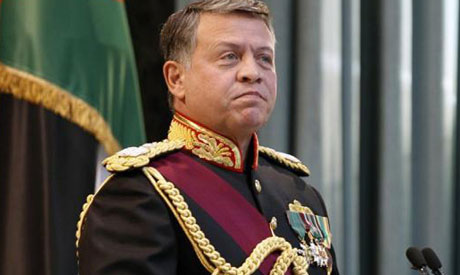By Tyler Yates
Impunity Watch, Middle East
A Jordanian activist has been found guilty of “harming the king’s dignity” for burning a street poster of Jordan’s King Abdullah II.

Odai Abu-Issa, an 18 year old from Madaba, 40 kilometers south of Amman, and a member of the Youth Movement for Reform, torched the poster in front of government office in southwest Jordan two weeks ago.
The charge is included among several acts that prohibit insulting the king, for which article 195 of Jordan’s penal code imposes sentences of between one and three years.
Abu-Issa was also charged with setting property on fire, which is punishable with hard labor.
While no clear motive for Abu-Issa’s actions has been reported, he belongs to a small group of young Jordanians who have been demanding that the king’s absolute powers be curbed.
A military prosecutor said the verdict was issued Thursday by the military State Security Court.
Human Rights Watch had been calling on Jordan’s prosecutor to drop the charges since they were first issued. Although criminal prosecutions for the destruction of other people’s property is permissible, criminalizing insults against a head of state is incompatible with international human rights standards protecting the right to freedom of expression, Human Right Watch said.
“Burning a royal’s image as a political statement should not be criminally prosecuted,” said Christoph Wilcke, senior Middle East researcher at Human Rights Watch. “To prosecute this act would send a chilling message that criticizing the king is off limits.”
Abu-Issa’s lawyer, Moussa Al-Abdallat, called the sentence “harsh” and said that he will appeal.
In December 2011, the State Security Court detained and charged Abu-Issa for slogans he shouted against the king during a protest in Madaba. The trials for this charge are still currently in progress.
Human Rights Watch has documented numerous cases of Jordan charging individuals under the laws prohibiting insulting the king, including incidents at a barbershop, during parliamentary campaigning, and for poetry published on facebook.
In early August, the United Nations Human Rights Committee issued a new general comment on the International Covenant on Civil and Political Rights Article 19. “The mere fact that forms of expression are considered to be insulting to a public figure is not sufficient to justify the imposition of penalties…in any case, the application of the criminal law should only be countenanced in the most serious of cases [of dangerous speech] and imprisonment is never an appropriate penalty.”
King Abdullah signed a law in September that restricts the State Security Court’s jurisdiction over civilians to four types of offenses – high treason, espionage, terrorism, and drug trafficking – but these changes do not go into force for three years. The Jordanian Parliament voted down proposals to remove the court’s entire jurisdiction over civilians.
For more information, please see:
Ahram — Jordan activist jailed for burning king’s picture — 26 Jan. 2012
Boston Globe — Jordan youth critical of king gets jail time — 26 Jan. 2012
Press TV — Jordanian jailed for burning king image — 26 Jan. 2012
IEWY — Jordan: Drop Charges for ‘Undermining Royal Dignity” — 24 Jan. 2012